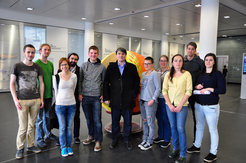MPS is new partner of AstroMundus
The Max Planck Institute for Solar System Research in Göttingen is now part of the European Master’s Degree Programme in Astronomy & Astrophysics.
Since the winter semester 2015/2016, the Max Planck Institute for Solar System Research (MPS) in Göttingen is an associate partner of the European Union’s Master’s Degree Programme, “AstroMundus”. The programme offers students from all over the world the opportunity not only to specialize in astronomy and astrophysics, but also to get to know different European locations where cutting-edge research is taking place. Alongside five other universities, among them the coordinating University of Innsbruck and the University of Göttingen, four associate research institutes, including MPS, are now part of the AstroMundus network.

Unlike the University of Göttingen, one of the founding institutes of AstroMundus, MPS is a new partner in the cooperation. “Since the relocation of the institute from remote Katlenburg-Lindau to the university town of Göttingen, MPS has been participating much more actively and effectively in students’ education”, says Prof. Dr. Laurent Gizon, director at MPS and professor at the Institute for Astrophysics at the University of Göttingen. “AstroMundus is an excellent building block in this endeavor”, he adds. In lectures and seminars, students from all over the world are now given the opportunity to learn about the institute’s research focus. Their master’s degree theses, too, can be supervised at MPS.
„AstroMundus is a very special Master’s Degree Programme“, says Dr. Sonja Schuh, AstroMundus-coordinator at MPS. “It requires of the students a great amount of self-reliance, flexibility, and mobility. At the same time they gain a valuable insight into different research institutes and profit from a large range of courses.”
While all participants spend the first two semesters at either the University of Innsbruck or the University of Rome, each student can then choose his or her own path. In the course of the two-year programme, this path will take the scholar to at least two and at most four of the AstroMundus locations: Innsbruck, Göttingen, Belgrade, Padua, and Rome.
„Due to its vital and creative research environment, Göttingen is a very popular location among the students”, says Schuh. Eight young researchers have come to Göttingen as part of the AstroMundus programme this semester.
Under the umbrella of the Educational Programme Erasmus+, the EU supports all in all 130 Master’s Degree Programmes. These span very different subject areas, such as humanities, economics, law, and science. The Master’s Degree Programme in Astronomy and Astrophysics carries the full name, “Erasmus Mundus Joint Master’s Degree Programme in Astronomy & Astrophysics” and has been educating young scientists for six years. A total of 55 students have achieved their Master’s degree through the programme during this time.
